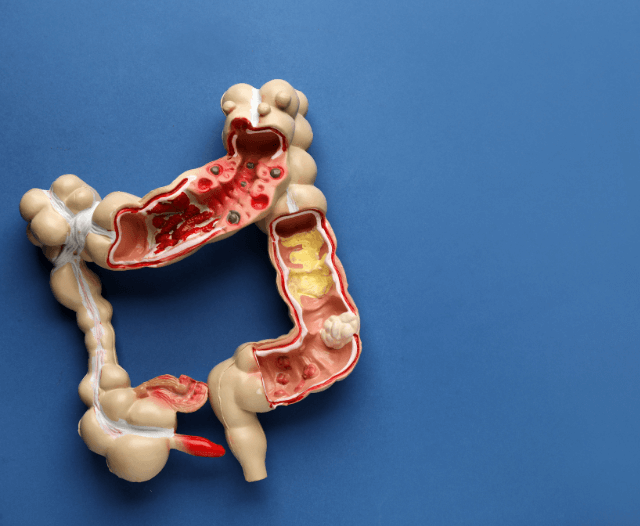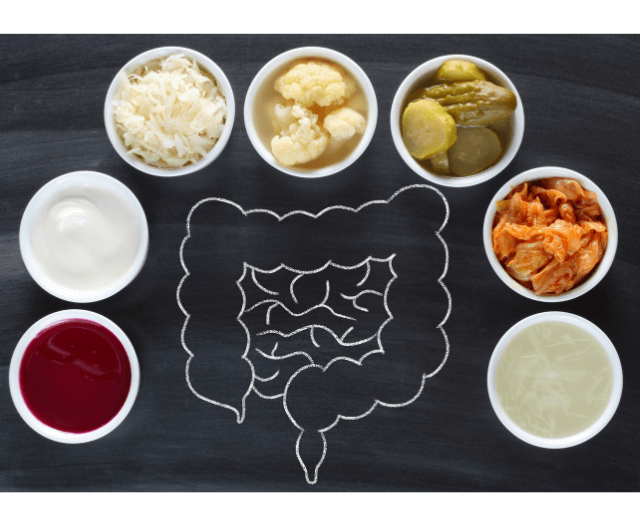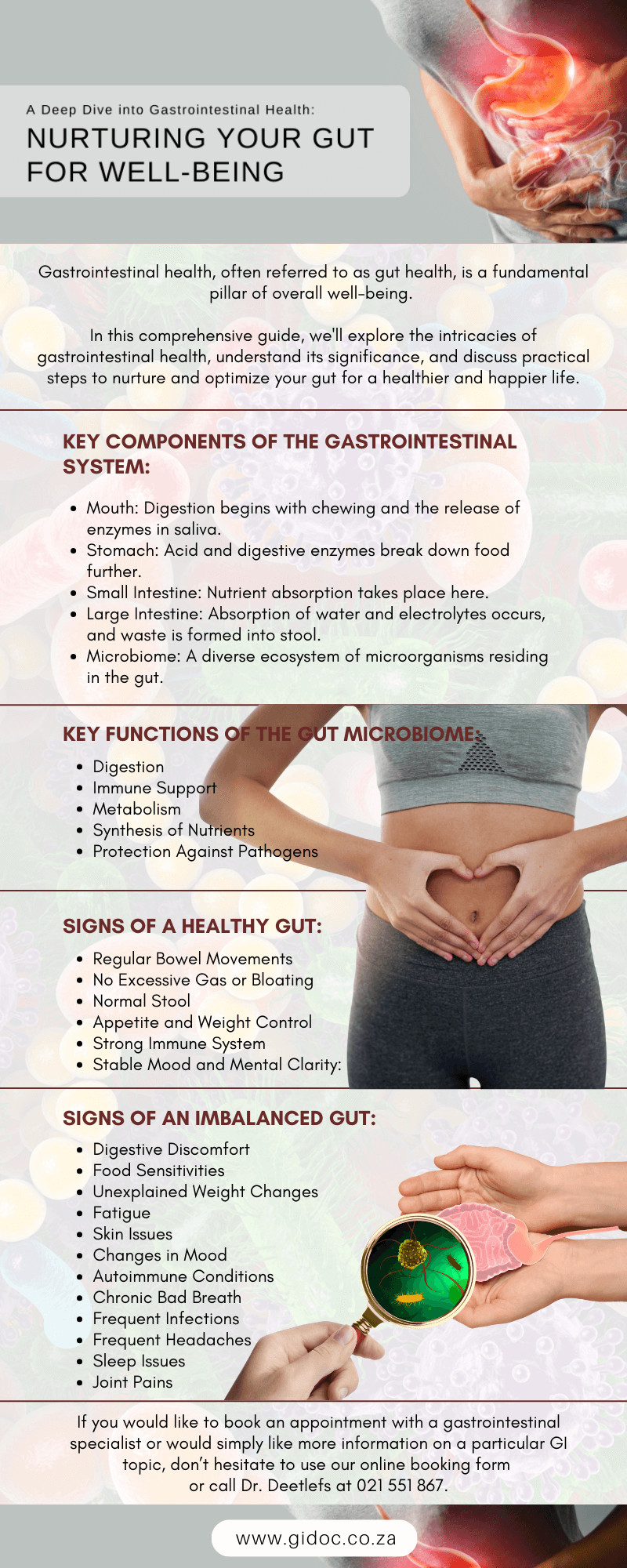Gastrointestinal health, often referred to as gut health, is a fundamental pillar of overall well-being.
The digestive system, with its intricate mechanisms and microbiome, plays a crucial role in maintaining our health.
In this comprehensive guide, we’ll explore the intricacies of gastrointestinal health, understand its significance, and discuss practical steps to nurture and optimize your gut for a healthier and happier life.
The Marvel of the Gastrointestinal System
The gastrointestinal system, also known as the digestive system, is a marvel of engineering.
It begins at the mouth, where digestion commences, and extends through the esophagus, stomach, small intestine, large intestine, and finally, the rectum and anus.
This system’s primary function is to process food and extract essential nutrients, vitamins, and minerals while eliminating waste.
Key Components of the Gastrointestinal System:
Mouth: Digestion begins with chewing and the release of enzymes in saliva.
Stomach: Acid and digestive enzymes break down food further.
Small Intestine: Nutrient absorption takes place here.
Large Intestine: Absorption of water and electrolytes occurs, and waste is formed into stool.
Microbiome: A diverse ecosystem of microorganisms residing in the gut.

Understanding the Gut Microbiome
The gut microbiome is an ecosystem of trillions of microorganisms, including bacteria, viruses, fungi, and other microbes.
It’s like a bustling city of microorganisms that play a critical role in digestion, metabolism, and even immune system function.
The composition and diversity of your gut microbiome can profoundly impact your health.
Key Functions of the Gut Microbiome:
Digestion: Gut bacteria assist in breaking down complex carbohydrates and fibers that the human body cannot digest on its own.
Immune Support: A healthy microbiome helps the immune system function optimally.
Metabolism: The gut microbiome can influence how the body stores fat and regulates blood sugar.
Synthesis of Nutrients: Some gut bacteria produce essential vitamins and nutrients.
Protection Against Pathogens: A diverse microbiome can help prevent the overgrowth of harmful bacteria.
Signs of a Healthy Gut
A well-functioning gastrointestinal system exhibits several signs of good health:
Regular Bowel Movements: Consistent, comfortable, and regular bowel movements are a hallmark of a healthy gut.
No Excessive Gas or Bloating: Occasional gas is normal, but excessive or chronic bloating and gas may indicate an imbalance.
Normal Stool: Healthy stool should be well-formed and easy to pass.
Appetite and Weight Control: A healthy gut helps regulate appetite and supports a balanced weight.
Strong Immune System: A robust immune response is a sign of a well-supported immune system.
Stable Mood and Mental Clarity: Emerging research suggests a connection between the gut and mental health.
Diagnosing an Unhealthy Gut:
Diagnosing an unhealthy gut or gut dysbiosis typically involves a combination of medical history, physical examination, and, in some cases, laboratory tests.
Here’s how healthcare providers diagnose an unhealthy gut:
- Medical History: A thorough medical history is an essential part of the diagnostic process. During this conversation, your healthcare provider will ask about your gastrointestinal symptoms, including diarrhea, constipation, bloating, abdominal pain, and changes in bowel habits.
- Physical Examination: A physical examination may be performed to assess your overall health and identify any signs of gastrointestinal distress.
- Stool Analysis: Stool tests can provide valuable insights into the composition of your gut microbiome and the presence of any imbalances.
- Blood Tests: Blood tests can be conducted to assess markers of inflammation and nutrient levels, which can indicate gut-related issues.
- Endoscopic Procedures: In some cases, your healthcare provider may recommend an endoscopy or colonoscopy.

The Connection Between Gut Health and Overall Well-Being
Gastrointestinal health is intricately linked to the body’s overall well-being. Recent scientific research has unveiled the gut-brain axis, a communication network that connects the gut and the brain.
What are some common signs of an imbalanced gut?
An imbalanced gut, often referred to as gut dysbiosis, can manifest in various ways. While not all signs may be present, here are some common symptoms and signs that may indicate an imbalance in your gut microbiome:
Digestive Discomfort: One of the most noticeable signs is persistent digestive discomfort, which can include bloating, gas, abdominal pain, cramping, and irregular bowel movements (diarrhea or constipation).
Food Sensitivities: An imbalanced gut can lead to increased sensitivity to certain foods, resulting in digestive symptoms like bloating, diarrhea, or stomach cramps after consumption.
Unexplained Weight Changes: Significant and unexplained weight loss or gain can be linked to an imbalanced gut, as the microbiome plays a role in nutrient absorption and metabolism.
Fatigue: An imbalanced gut may affect nutrient absorption, potentially leading to anemia or nutrient deficiencies, which can cause fatigue.
Skin Issues: Skin conditions such as acne, eczema, or rosacea can be associated with gut dysbiosis, as the gut and skin are interconnected.
Changes in Mood: Emerging research suggests a link between gut health and mental well-being. Anxiety, depression, and mood swings can sometimes be connected to gut imbalances.
Autoimmune Conditions: Some autoimmune conditions have been linked to imbalances in the gut, as gut health is closely related to the immune system.
Chronic Bad Breath: An imbalanced gut can lead to bad breath that doesn’t improve with oral hygiene practices.
Frequent Infections: A weakened gut can make you more susceptible to infections as a balanced gut microbiome plays a significant role in the immune system.
Frequent Headaches: Recurring headaches or migraines can sometimes be related to an imbalanced gut.
Sleep Issues: An imbalanced gut can affect sleep patterns, causing difficulties with both falling asleep and staying asleep.
Joint Pain: In some cases, joint pain and conditions like rheumatoid arthritis have been associated with gut dysbiosis.
Chronic Diarrhea or Constipation: An imbalance can lead to persistent changes in bowel habits, including frequent diarrhea or long-term constipation.
Skin Rashes or Irritations: Conditions like psoriasis, dermatitis, or hives may be related to gut health.
Autoimmune Disorders: Some autoimmune disorders, like celiac disease, are closely linked to the gut, with the immune system mistakenly attacking the body’s own tissues.
It’s important to note that these symptoms can have various causes, and experiencing one or more of them doesn’t necessarily mean you have gut dysbiosis.

Nurturing Your Gut for Better Health
Caring for your gastrointestinal health is a proactive step towards improved overall well-being. Here are some practical strategies to optimize your gut health:
Eat a Diverse Diet:
A varied diet rich in fiber, fruits, vegetables, and whole grains supports gut health by promoting a diverse microbiome.
Include Fermented Foods:
Yogurt, kefir, sauerkraut, and kimchi contain beneficial probiotics that contribute to gut health.
Stay Hydrated:
Adequate water intake is essential for digestive health and the absorption of nutrients.
Manage Stress:
Practicing stress-reduction techniques such as meditation and yoga can help maintain a healthy gut-brain axis.
Avoid Excessive Antibiotic Use:
Overuse of antibiotics can disrupt the gut microbiome. Use them only when necessary.
Get Regular Exercise:
Physical activity supports gastrointestinal motility and overall health.
Limit Processed Foods:
Processed foods often contain additives that can negatively affect the gut. Opt for whole, unprocessed foods.
Sleep Well:
Quality sleep is essential for a healthy gut and overall well-being.
Be Mindful of Food Sensitivities:
Identify and manage any food sensitivities or allergies that may disrupt your gut.
Stay Informed:
Keep up with the latest research on gut health to make informed choices about your diet and lifestyle.
When to Seek Medical Advice
While many digestive issues can be managed with lifestyle changes, it’s crucial to seek medical advice if you experience persistent or severe gastrointestinal symptoms, unexplained weight loss, or if you have a family history of gastrointestinal conditions.
A healthcare provider can diagnose and provide guidance on the management of conditions like irritable bowel syndrome (IBS), Crohn’s disease, and ulcerative colitis.

Contact Dr. Deetlefs
Dr Eduan prides himself on his ability to help his patients to the best of his ability by embracing good listening skills, effective communication, compassion and knowledge and skill honed during years of private gastroenterology practice.
If you would like to book an appointment with a gastrointestinal (GI) specialist or would simply like more information on a particular GI topic, don’t hesitate to use our online booking form or call Dr. Deetlefs at 021 551 867.
DISCLAIMER: PLEASE READ CAREFULLY
The information on this website is to provide general guidance. In no way does any of the information provided reflect definitive medical advice and self-diagnoses should not be made based on information obtained online. It is important to consult a Gastroenterologist or medical doctor regarding ANY and ALL symptoms or signs including, but not limited to: abdominal pain, haemorrhoids or anal / rectal bleeding as it may a sign of a serious illness or condition. A thorough consultation and examination should ALWAYS be performed for an accurate diagnosis and treatment plan. Be sure to call a physician or call our office today and schedule a consultation.
© Dr. Eduan Deetlefs, Registered Gastroenterologist, GI Doc Cape Town
Our website information is not intended or implied to be a substitute for professional medical advice, diagnosis or treatment. Please consult a doctor about your specific condition. Only a trained physician can determine an accurate diagnosis and proper treatment.


